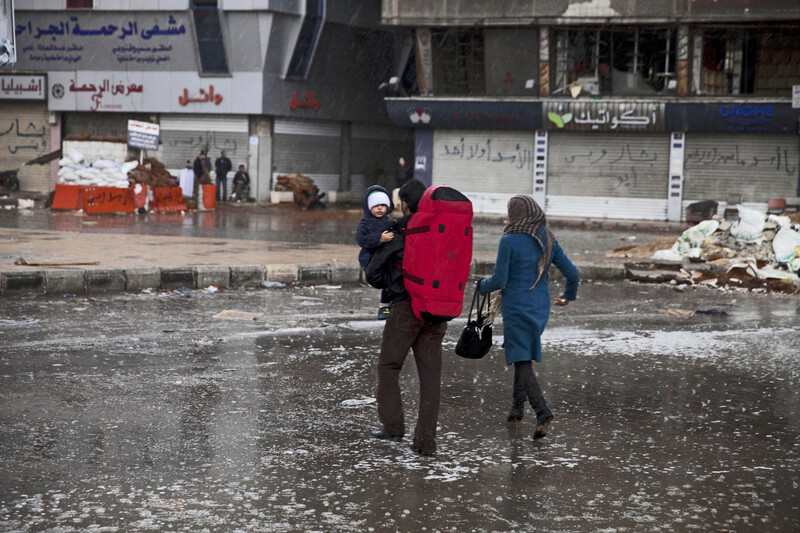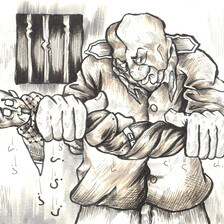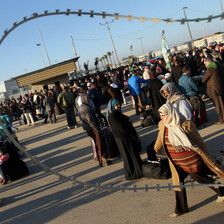The Electronic Intifada Texas 5 July 2013

Most of Yarmouk camp’s residents have been displaced by fighting.
Polaris/NewscomFollowing an uptick in the ongoing violence in Syria, Mahmoud al-Shihabi decided to leave his home in Damascus’ Yarmouk refugee camp during December 2012.
After half a dozen trips to the United States embassy in Lebanon, the 49-year-old attained a visa to reunite with his wife, a Cuban national, in Austin, Texas.
The voyage from Damascus to Beirut meant crossing 14 checkpoints, paying off border guards, and searching for a place to sleep in the already overcrowded Shatila refugee camp in Beirut. After undertaking a series of interviews, filling out countless forms, and paying a number of expensive fees, he made it to Texas in May, where he is now living with his wife and son.
“My story is not just my own story,” al-Shihabi told The Electronic Intifada. “It is the story of all Palestinian refugees in Syria, and many Syrians who are also suffering because of the situation.”
“No more work”
Once the uprising broke out in March 2011, al-Shihabi was forced to give up his two jobs. After working as a civil engineer and a tour guide for more than two decades, he said “there was no work anymore.”
Though some Palestinians have joined Syrian opposition forces and others have thrown their weight behind the regime, most are simply trying to find a way to survive during the crisis. “I don’t care who wins the fight in Syria — the opposition or the regime — because I’m Palestinian. All I care about is returning to Palestine,” said al-Shihabi.
Al-Shihabi’s family is originally from Lubya in the Tiberias region of Palestine. When the village was occupied and destroyed by Zionist militias during the 1948 Nakba, the forced expulsion of Palestinians from their homeland, his parents and siblings fled. They slept in a forest in Lebanon for weeks before they moved on to Damascus, where they eventually settled in Yarmouk.
“My mother says that being driven from Yarmouk is harder than the Nakba,” al-Shihabi said. “She is an 86-year-old woman now, you know, and it’s hard on her to have to leave her home again.”
“Between two fires”
In December, he said, Syrian opposition forces arrived in Yarmouk. “I saw foreign fighters in the camp, from Saudi Arabia, Yemen, Tunisia, Albania,” al-Shihabi recounted. While he was in Beirut for a visa interview with the US embassy, fighters showed up at his house while only his mother and one of his sisters were home.
When fighters from both regime forces and the opposition began to saturate the streets of the camp in December, most Palestinians, along with many unaligned Syrians, found themselves “caught between two fires.” According to al-Shihabi, only small Palestinian groups were present and they scarcely had the means to protect the local population.
A clash between rebels and the regime ensued in heavily-concentrated civilian areas of the camp. Eventually, as part of an effort to expel opposition fighters from the outskirts of the capital, the Syrian military bombed the camp, killing at least 25 persons sheltering in a mosque, according to Reuters (“Syrian jets rocket Palestinian camp in Damascus,” 16 December 2012).
Because some supporters of Bashar al-Assad, the Syrian president, had taken shelter in Yarmouk after being uprooted from nearby neighborhoods, opposition forces searched dozens of homes, he said. “They told my mother she had to leave because they believed that the regime’s military was camping out in our homes,” al-Shihabi explained, adding that a number of homes on his street were subsequently destroyed.
His mother and oldest sister Fatma left the camp and found an apartment in a part of Damascus less affected by the violence. “My sister Mariam went to another part of Syria where there’s less fighting, my other sister Zahra went to the [United Arab] Emirates with her husband to get away from the violence, and the other two are in refugee camps in Lebanon.”
Scattered across globe
Like so many Palestinian families, his relatives are scattered across the globe. He also has two brothers in Canada, one in Bulgaria and another in Australia.
Al-Shihabi worries about his relatives who fled from Syria to Lebanese camps, where “our refugees are treated like animals. Worse than animals. We had better treatment in Syria, which is also part of the reason most of us didn’t want to enter the fight. We could work any job, and the regime gave us every right except the right to vote.”
He also said he was lucky enough to have had the financial means to make it out of Syria, though most simply don’t have enough money.
Though the supplies provided by the UN agency for Palestine refugees, UNRWA, had been thinning for a long time in Yarmouk, al-Shihabi said they have virtually stopped since the fighting erupted. “There’s no medicine, food or clothes, there’s nothing in the camp. People used to come to buy cheap goods from us, but now the Palestinians who stayed have to travel very far just to get bread.”
Very few have stayed in the camp to try and outlast the violence. He estimated that “Yarmouk today is around 90 percent empty. Most of the people who stayed are living in the UNRWA schools.”
The fighting in Syria has put the fate of thousands of Palestinians, already displaced by Israel, in the hands of others once again. “Why don’t the Gulf countries funding this war use that money to liberate Palestine?” he asked. “If they care about al-Aqsa [mosque] so much, why don’t they use their weapons and money to free Jerusalem?”
“Hell will end”
Though he plans on staying in Austin for now, al-Shihabi is confident he will reunite with his mother in Syria, and bring his wife and son along, who has only met his grandmother once before. “For now I’m staying in Texas. But if I could go back to Palestine tomorrow, I’m gone.”
In addition to Lebanon, the countries where Palestinian refugees in Syria have fled to include Iraq, Turkey and Egypt. Some have also gone to Gaza. They live in harsh conditions, lack basic resources and supplies and often suffer discrimination.
Last year, although Jordanian authorities have permitted thousands of Syrian refugees into the country, Palestinians fleeing alongside them were turned away at the border and others were “arbitrarily detained … in a refugee holding center without any option for release other than returning to Syria,” according to Human Rights Watch (“Jordan: Bias at the Syrian border,” 4 July 2012).
Al-Shihabi expressed frustration that media outlets covering Palestinian refugees fleeing from Syria have failed to mention that they should have been allowed to return to their homes in Palestine in the first place.
“This hell will end,” he concluded. “I have more hope than the whole world that we are returning to Palestine because Lubya’s dirt is in my blood. And if I don’t return, my children or their children will. I’m sure of that.”
Patrick O. Strickland is a freelance journalist whose writing has appeared in Al Jazeera English, International Socialist Review, Truthout, and others. Follow him on Twitter: PStrickland.





